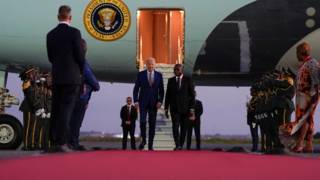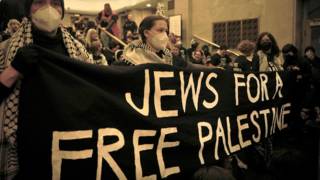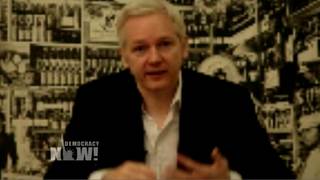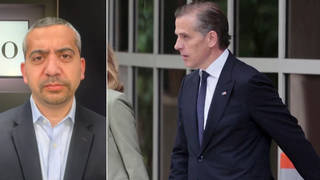
Related
Guests
- Trevor TimmFreedom of the Press Foundation, activist with the Electronic Frontier Foundation.
- Glenn Greenwaldcolumnist and blogger for The Guardian, author of With Liberty and Justice for Some: How the Law Is Used to Destroy Equality and Protect the Powerful. He is giving the keynote address this morning at the Freedom to Connect conference.
WikiLeaks is set to receive major new financial support this week from a new group that funds independent journalism organizations dedicated to transparency and accountability in government. This comes as MasterCard, Visa and PayPal continue to refuse to process payments for WikiLeaks, making it difficult to send donations. “We don’t need just one WikiLeaks; we need 10 WikiLeaks or a hundred. We have a situation in this country where government secrecy is at an all-time high,” says Freedom of the Press Foundation co-founder and executive director Trevor Timm. We are also joined by Guardian columnist Glenn Greenwald, who is a member of the foundation’s board. [includes rush transcript]
Transcript
AMY GOODMAN: We’re broadcasting from the Freedom to Connect conference at AFI—that’s the American Film Institute—Silver in Silver Spring, Maryland. Our guest, Glenn Greenwald, constitutional lawyer, blogger, journalist with The Guardian magazine—with The Guardian newspaper in Britain, has been talking and writing extensively about WikiLeaks as well as Bradley Manning, just gave a speech in Brooklyn yesterday and this morning is giving the keynote address here at the Freedom to Connect conference. We’re going to turn right now to our next guest. His name is Trevor Timm. He has just founded a new organization called the Freedom of the Press Foundation.
Welcome to Democracy Now!, Trevor. Talk about the foundation.
TREVOR TIMM: Thanks for having me.
Well, we started the Freedom of the Press Foundation about three months ago, and our goal here is to protect, support and defend organizations like WikiLeaks and a lot of other innovative journalism organizations that push for transparency and accountability in government. You know, a lot of times, as you’ve been talking about on the show, that we have seen an unprecedented attack on whistleblowers and a sort of criminalization of leaks, and yet leaks and whistleblowers and media organizations publishing classified information in the government interest is American as apple pie, and there has been decades and decades with which this type of—this type of activity has been protected by the First Amendment. And since we’ve seen this kind of war on whistleblowers, we wanted to start an organization that could really defend these organizations aggressively and make sure that we didn’t lose that avenue for government transparency.
AMY GOODMAN: Let’s talk about WikiLeaks. First I want to play a clip, 2011, WikiLeaks founder Julian Assange receiving the award for the Most Outstanding Contribution to Journalism at the 2011 Walkley Awards. This is a clip from his acceptance speech.
JULIAN ASSANGE: We journalists are at our best when we share with activists and lawyers the goal of exposing illegality and wrongdoing, when we help to hold others to account. This award is a sign of encouragement to our people and other people who labor under difficult conditions in this task.
Our lives have been threatened. Attempts have been made to censor us. Banks have attempted to shut off our financial lifeline. An unprecedented banking blockade has shown us that Visa, MasterCard, PayPal, the Bank of America and Western Union are mere instruments of Washington foreign policy. Censorship has, in this manner, been privatized.
Powerful enemies are testing the waters to see how much they can get away with, seeing how they can abuse the system that they are integrated with to prevent scrutiny. Well, the answer is, they can get away with too much. I expected the hate speech on Fox News, but not the calls by U.S. senators for the extrajudicial assassination of myself and my staff. Neither did I expect that the United States would aggressively undermine its own Constitution to persecute me and my organization. But I can understand the Washington elite’s reaction. Washington is waging a war against the truth. It was, after all, the truth about Washington and their friends that we revealed.
AMY GOODMAN: Julian Assange accepting the award for Most Outstanding Contribution to Journalism at the 2011 Walkley Awards in Brisbane, Australia. He sent a video. He was under house arrest in Britain. Assange currently remains holed up in the Ecuadorean embassy in London, fighting extradition to Sweden, even as WikiLeaks continues to receive recognition for its work. In fact, this week it’s set to receive major new funding from the Freedom of Press Foundation, the group that funds independent journalism organizations dedicated to transparency and accountability in government. Trevor, talk about what is happening, what your organization, the Freedom of Press Foundation, is planning to do.
TREVOR TIMM: Sure. So, a major part of our mission is to crowdsource funding for organizations like WikiLeaks who are under attack, who may have gotten cut off from payment processors like Visa, MasterCard and PayPal. So, for two years now, they’ve barely been able to get any donations. And when we launched in December, we started taking donations in a tax-deductible way so U.S.—people in the U.S. could safely and relatively anonymously donate to WikiLeaks. But they can also donate to other journalism organizations that do similar work, so groups like the National Security Archives, which has the largest library of declassified material in the country, or new organizations like MuckRock, which do Freedom of Information Act work where they allow citizens to file their own requests. And so, we set this up to, you know, help organizations like WikiLeaks, but we also want to bring attention to other groups that are doing really innovative work in trying to bring transparency to government.
AMY GOODMAN: So, how are you going to get this money to WikiLeaks? Have you spoken, for example, to PayPal, Visa, MasterCard?
TREVOR TIMM: Well, you know, we’re fairly confident that they’re not going to cut us off at this point. I think the level of hysteria has died down from late 2010. And, you know, companies have had a chance to do legal research and realize that nothing that WikiLeaks is doing by publishing this information is against the law. Obviously, every day or every week newspapers around the country, like The New York Times, The Washington Post or The Wall Street Journal, publish classified information, a lot of times at a higher level of secrecy than WikiLeaks did. And, you know, if these companies were to cut us off, they wouldn’t just be cutting off WikiLeaks. It’s important to emphasize that we’re completely an independent organization from WikiLeaks, and we take donations to a variety of journalism organizations and do different types of freedom of information advocacy work. And so, they wouldn’t be cutting off WikiLeaks; they’d be cutting off the freedom of the press.
AMY GOODMAN: Glenn Greenwald, you’re on the board of this organization. Why do you feel this is so critical right now?
GLENN GREENWALD: I think the campaign to—the extrajudicial campaign to essentially punish WikiLeaks for a crime with which it had never been charged and with which it could never have been charged, to impose punishment on it, was incredibly dangerous. I mean, if the government can influence private corporations to cut off funding to media outlets that it dislikes, without having to charge them with a crime, it can shut down any form of journalism that it feels is threatening. And so, what we really wanted to do was create a network to prevent the government from ever doing this again, so if it cuts off funding to other journalism outlets, and we wanted to have an answer to what it did to WikiLeaks, as well, which is to say, we’re gone to circumvent your blockade in a permanent way so that you can never do this to any other journalistic outlet again.
AMY GOODMAN: Trevor Timm, you said in your speech yesterday here at the Freedom to Connect conference, that you want to support other WikiLeaks.
TREVOR TIMM: Absolutely. I mean, we don’t need just one WikiLeaks; we need 10 WikiLeaks or a hundred. You know, we have a situation in this country where government secrecy is at an all-time high. I mean, last year they classified 92 million documents. At this point, basically everything in the foreign policy and national security realm is considered classified, and the government thinks that it can dole out this information as it sees fit and can use secrecy to hide all sorts of potential illegality and unconstitutional behavior, like, for example, the CIA drone program and the NSA warrantless wiretapping program. And we want to be a—we want to encourage other organizations to blossom that can function like WikiLeaks, where there is an anonymous submission system, where whistleblowers can go and safely upload material to get it to the public, because right now that’s sorely lacking in this country.
AMY GOODMAN: You addressed the Freedom to Connect conference and talked about the drone program.
TREVOR TIMM: Yeah, so, you know, there are literally hundreds of times where the government officials, whether anonymous or otherwise, have talked about the drone program to journalists, and it’s been on the front pages of the nation’s newspapers for the last three or four years. Yet in court documents just two weeks ago, the government refused to even confirm or deny that the program itself exists. And, you know, given that there is also a legal rationale that has leaked that the Obama administration uses to target American citizens abroad, it is in the public’s interest to know this information, and the government should be compelled to release it. But if they’re not, we should be able to find out about it other ways, and that is through leaks.
AMY GOODMAN: Glenn Greenwald, we were just talking about Bradley Manning and the journalists who aren’t there. There’s been a lot of brouhaha over comments of Bob Woodward. Talk about the controversy around Bob Woodward, why you think that’s important. Ron Fournier, also you’ve written about, of the Associated Press. But also, where are these reporters when it comes to covering Bradley Manning?
GLENN GREENWALD: That was what was so bizarre about this whole episode, what really triggered the acrimony, the open acrimony between the White House or D.C. press corps and the White House. And you like to see acrimony. It’s very rare that you see acrimony. There should be acrimony: They’re supposed to be adversarial. But it was an extremely trivial, though revealing, episode where the president played golf with Tiger Woods. The reporters who cover the president were blocked from getting pictures of Tiger and seeing the golf game and being able to ask who won the game and what their scores were. And so they began, for the first time under President Obama, complaining about transparency. So here you have this administration that has been waging war on transparency in very damaging ways that they’ve essentially ignored, and it was sort of this that triggered it.
And then Bob Woodward was sort of criticizing the White House for not breaking the law by indicating that it would adhere to the sequestration and budget—and military cuts mandated by it and withdrawing aircraft carriers, essentially demanding that the president break the law and be more militaristic. And so you see that the press corps not only is neutral on these questions; they ignore, because they endorse, the kind of secrecy that we’re discussing on these substantive issues and want transparency only on the kind of trivial issues that they cover. And that, of course, is the principal problem.
AMY GOODMAN: You accused Woodward of being Nixonian.
GLENN GREENWALD: Yeah, I mean, he essentially was angry that President Obama’s pretense for removing that aircraft carrier from the Persian Gulf was that the law mandates military cuts. He was essentially saying George Bush would never have allowed a piece of paper to get in the way, or Ronald Reagan would never have allowed a piece of paper. And what he meant by “a piece of paper” was the law. And it was just ironic that Bob Woodward, who is—the lore was that he brought down the Nixon administration for being lawless—was essentially embracing the core Nixonian statement that if the president does it, by definition it’s not illegal. It’s sort of a—Bob Woodward is kind of the real symbol of what has happened to the U.S. media in this country from going 40 years ago to being adversarial to the government to being the ultimate insider endorsing and serving it.
AMY GOODMAN: Trevor Timm, you’re also with the Electronic Frontier Foundation, EFF. Where does that fit into all of this?
TREVOR TIMM: Well, with the Freedom of the Press Foundation, EFF is our legal counsel. And when we go back to how this organization first started, a bunch of us at EFF were talking about what we could do to solve this financial blockade problem, because we saw it as this, you know, real injustice where there was no real legal solution because these organizations like PayPal and Visa and MasterCard have terms of service where they can basically cut off organizations for anything they like. They’re written broadly so they can do that. And, of course, the pressure on these companies from the government officials was unofficial, so there was no real First Amendment lawsuit to bring. But what ended up coming out of that is we started talking to a lot of other people, and—like Glenn and like Pentagon Papers whistleblower Daniel Ellsberg and filmmaker Laura Poitras and activist and actor and director John Cusack. And so, eventually we all got together, and we wanted to start this broader organization.
AMY GOODMAN: And why is the actor John Cusack interested in this?
TREVOR TIMM: Well, he’s actually had a longtime interest in all of these issues, from free speech to whistleblowers to just accountability in government. And he is friends with a few of our board members, I think including Glenn. And when he heard about what we were doing, he was really excited, and he asked us what he could do to help. And so far, you know, he’s been hugely helpful in this area. He’s actually to start off the second bundle, where we’re supporting not just WikiLeaks, but Bureau of Investigative Journalism, Center for Public Integrity and Truthout. He actually gave a $10,000 matching donation to encourage other people to donate to these transparency organizations, so he’s been a huge help.












Media Options